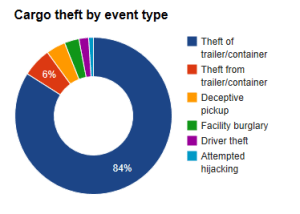June 6, 1944. It’s a date that stands out in history, and one that most people know by heart. It is D-Day. Seventy years ago 160,000 allied troops landed along the beaches of Normandy to fight Nazi Germany. While the casualties were high, it enabled the allied forces to gain a foothold in Europe. This foothold led to the eventual march across Europe and defeat of Adolf Hitler’s troops. Today we remember the soldiers from the allied forces that served for the greater good.
And now, on to this week’s news:
- Milestone: Majority of Fortune 100 monitor human rights
- Costco testing home delivery
- Freight train trial could lead to rail rebirth
- Cargo thefts fall; loss value jumps
- Cass freight index
A “milestone” has been reached as the majority of Fortune 100 companies are actively monitoring their supply chains for human rights abuses. According to the American Bar Association, the majority of Fortune 100 companies with publicly available policies have developed policies to address forced labor and human trafficking. These major companies are moving quickly to develop policies that address human rights and labor abuses within their supply chains, and to train their employees accordingly. According to Arizona State University professor Daniel Rothenberg, who led the research, “Some of these changes are driven by legislation, but there also appears to be an emerging norm among businesses that these issues are a key element of corporate social responsibility.”
Costco is continuing to test its home delivery service. As part of this test, the wholesaler is teaming up with Google in Northern California, and expanding the item selection that is available for home delivery. As more people opt for home delivery, it is evident that even the giant wholesale outlets need to change with the times. However, Costco does not see the home delivery business becoming their primary target, as their in-store foot traffic is the main driver for sales.
A trial run from TNT Express in the UK could lead to the rebirth of business-to-business rail delivery for the first time in 20 years. The project aligns with Government policy to encourage greater “mode shift” of freight from road to rail, as evident in Network Rail’s recent ‘Freight Market Study’ which forecasts a potential doubling to 45.2bn tons per year in rail freight traffic over the next 30 years. While the rail system will allow retailers and manufacturers to move more tonnage of goods at one time, the benefits can be seen from an environmental standpoint,
” As well as delivering a much faster service to customers, with trains running at up to 95 mph, moving an element of freight from road to rail will also significantly cut carbon emissions, with every ton moved by rail saving around three-quarters of the emissions per kilometer compared to road haulage.”
In the rolling quarter from February-April, 178 cargo thefts were reported in the U.S., according to a report released this week by FreightWatch International. That’s a 25 percent drop from the previous quarter (November-January), but the average value per load jumped 98 percent to $245,101, FreightWatch’s report says. The big categories of the thefts were food and drink, home and garden, and electronics, while theft of trailer or container made up 150 of the 176 thefts in the quarter (84%).
And finally, according to the Cass Freight Index, North American freight shipments and expenditures continued to buck the historic trend and increased again in May. The first five months of 2014 were the strongest since the end of the great recession. May shipment volumes and expenditures each climbed around 1%, indicating the overall health of the economy is moving in the right direction.
That’s all for this week. Enjoy the weekend and the song of the week, Fell in Love with a Girl by the White Stripes:



















Leave a Reply